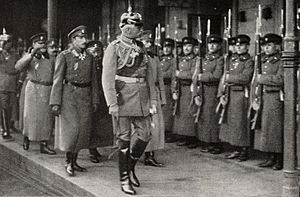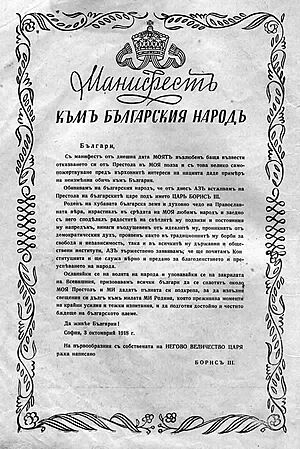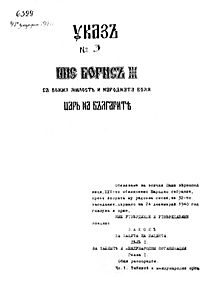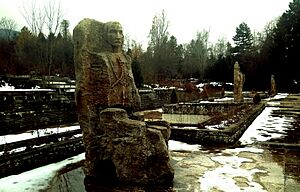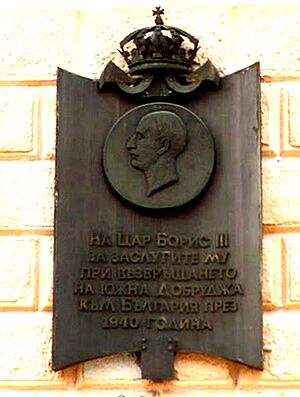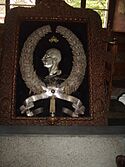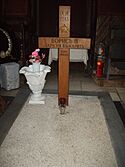Boris III of Bulgaria facts for kids
Quick facts for kids Boris III |
|||||
|---|---|---|---|---|---|
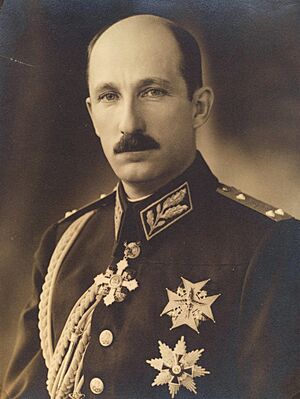 |
|||||
| Tsar of Bulgaria | |||||
| Reign | 3 October 1918 – 28 August 1943 | ||||
| Predecessor | Ferdinand I | ||||
| Successor | Simeon II | ||||
| Born | 30 January 1894 Vrana Palace, Sofia, Bulgaria |
||||
| Died | 28 August 1943 (aged 49) Sofia, Bulgaria |
||||
| Burial | Rila Monastery | ||||
| Spouse |
Giovanna of Italy
(m. 1930) |
||||
| Issue |
|
||||
|
|||||
| Bulgarian | Борис III | ||||
| House | Saxe-Coburg and Gotha-Koháry | ||||
| Father | Ferdinand I of Bulgaria | ||||
| Mother | Marie Louise of Bourbon-Parma | ||||
| Religion |
|
||||
| Signature |  |
||||
Boris III (Bulgarian: Борѝс III; 30 January 1894 – 28 August 1943) was the Tsar (King) of Bulgaria from 1918 until his death. His full name was Boris Klemens Robert Maria Pius Ludwig Stanislaus Xaver.
He became Tsar after his father, Ferdinand I, stepped down from the throne. This happened because Bulgaria lost World War I. After the war, Bulgaria had to give up land and pay a lot of money.
Boris III faced many challenges. There were changes in government and a short border conflict with Greece. He eventually took strong control of the country.
When World War II started, Bulgaria tried to stay neutral. However, it later joined the Axis powers (Germany, Italy, Japan). This helped Bulgaria get back some lands it had lost. Boris III refused to send Bulgarian soldiers to fight against the Soviet Union. He also played a key role in saving the Jewish people living within Bulgaria's old borders during the Holocaust. He died in 1943, and his young son, Simeon II, became the next Tsar.
Contents
Early Life and Education
Boris was born in Sofia, Bulgaria, on January 30, 1894. His parents were Ferdinand I, who was then the Prince of Bulgaria, and Princess Marie Louise of Bourbon-Parma.
When Boris was a baby, his father decided to change his religion from Catholic to Eastern Orthodox. This was done to improve relations with Russia. This decision made his mother and Catholic relatives unhappy.
Boris went to a special school in the Palace that his father created for his sons. He also studied at the Military School in Sofia. He fought in the Balkan Wars and served as an officer during World War I. He was known for his bravery and earned respect from both Bulgarian and German commanders.
Becoming Tsar and Early Challenges
In September 1918, Bulgaria was defeated in World War I. His father, Ferdinand I, then gave up his throne. Boris became Tsar on October 3, 1918.
A year later, Aleksandar Stamboliyski became prime minister. He was popular with farmers but not with the middle class or the military. In 1923, Stamboliyski's government was overthrown by a military coup, and he was killed.
Bulgaria faced more problems. In 1925, there were attacks on Boris and a church bombing in Sofia. This led to many people being killed. Later that year, there was a short border conflict with Greece, which was resolved by the League of Nations.
In 1934, a military group called Zveno took control of the government. They banned all political parties and made Boris a ruler with little real power. However, Boris managed to overthrow them the next year and regained control of the country. He then ruled with strong authority, though he brought back a type of parliament without political parties.
During this time, Bulgaria experienced a period of growth and success. Many people admired Tsar Boris. He was known for being easy to approach and often drove his car around the country, stopping to talk with ordinary people.
Family Life
Boris married Giovanna of Italy, the daughter of Victor Emmanuel III of Italy. Their wedding took place in Assisi, Italy, on October 25, 1930.
They had two children:
- A daughter, Maria Louisa, born in 1932.
- A son, Simeon, born in 1937. Simeon later became Tsar Simeon II.
Bulgaria in World War II
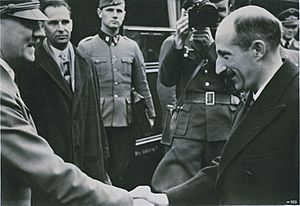
When World War II began, Bulgaria tried to stay neutral. However, powerful groups in the country wanted to side with Germany. Bulgaria had lost important lands after World War I, including Southern Dobruja to Romania and Western Thrace to Greece. Bulgarians wanted these lands back.
Adolf Hitler tried to gain Tsar Boris III's support. In 1940, with Germany's help, Bulgaria got Southern Dobruja back from Romania. This made the Bulgarian people very happy. In March 1941, Boris allied Bulgaria with the Axis powers. This allowed Bulgaria to regain parts of Macedonia and Greek Thrace. Because he brought these lands back, Tsar Boris was called "the Unifier."
Despite this alliance, Boris did not fully cooperate with Germany. He refused to send Bulgarian soldiers to fight against the Soviet Union on the Eastern Front. He also did not allow Bulgarian volunteers to join the German army.
However, joining the Axis had a cost. In 1940, Bulgaria passed the "Law for Protection of the Nation." This law was similar to laws in Nazi Germany. It limited the rights of Jewish people in Bulgaria, made them pay new taxes, and restricted their jobs. Many Bulgarians protested against this law.
Saving Bulgarian Jews
In early 1943, German officials arrived in Bulgaria to arrange the deportation of Jewish people. They planned to deport over 11,000 Jews from areas Bulgaria had occupied in Greece and Yugoslavia. These Jews did not have Bulgarian citizenship. They were sent to death camps like Auschwitz-Birkenau and Treblinka.
The Germans also planned to deport 20,000 Jews from Bulgaria itself. However, news of these plans spread, and many Bulgarians protested. People from all walks of life, including politicians and the head of the Bulgarian Orthodox Church, spoke out.
Facing strong public pressure, Tsar Boris III decided to stop the deportation of Jews from Bulgaria's old borders. He told German officials that these Jews were needed for labor, like building roads. While the Jews from the occupied territories were tragically sent to death camps, the nearly 50,000 Jews living in Bulgaria proper were saved.
Boris continued to resist German demands to deport Bulgarian Jews. He even explored ways to send them to British-controlled Palestine.
Meetings with Hitler
Hitler continued to pressure Tsar Boris III to deport all Jews. In May 1943, there were plans to deport over 48,000 Bulgarian Jews. Boris kept delaying, insisting that the Jews were needed for work in Bulgaria.
Public outcry and protests, led by figures like Dimitar Peshev and Archbishop Stefan, helped Boris stand firm. He refused to hand over Bulgaria's Jews.
In August 1943, Hitler called Boris to a meeting in Germany. Reports say Hitler was very angry that Boris refused to send troops to fight the Soviet Union or deport the Jews. Boris maintained his position, stating that many Bulgarians felt close to Russia and that Turkey's position was uncertain. At the end of the meeting, it was agreed that Bulgarian Jews would not be deported.
Death
Shortly after returning from his meeting with Hitler, Tsar Boris III died on August 28, 1943. He was 49 years old. The official cause was heart failure.
However, there were many rumors about his death. Some believed Hitler had him poisoned because of his refusal to deport Jews or send troops to the Soviet Union. Other theories suggested the Soviet Union might have been involved. His daughter, Princess Marie Louise, said there was no clear answer but believed he was not poisoned by the Nazis or British.
Boris was succeeded by his six-year-old son, Simeon II. A group of regents, including Boris's brother Prince Kiril, ruled until Simeon was old enough.
Boris III had a large state funeral in Sofia. His coffin was then taken to the Rila Monastery, a very important monastery in Bulgaria, where he was buried.
After the Communists took power in 1944, they secretly moved his body. Later, they moved it again to an unknown location. After communism ended, only his heart was found at Vrana Palace. In 1994, his widow took his heart back to Rila Monastery, where it was reburied.
A wood carving near his grave at Rila Monastery, made in 1943, reads: "To its Tsar Liberator Boris III, from grateful Macedonia."
Honours and Tributes
Boris III received many awards and honors from Bulgaria and other countries.
In 1996, a monument was built in Israel to honor Tsar Boris III for saving Bulgarian Jews. However, this monument was later removed in 2003 because Bulgaria had allowed the deportation of Jews from the occupied territories.
A large park in Sofia, Borisova gradina, and a major boulevard are named after him.
Images for kids
See also
 In Spanish: Boris III para niños
In Spanish: Boris III para niños
 | Charles R. Drew |
 | Benjamin Banneker |
 | Jane C. Wright |
 | Roger Arliner Young |


